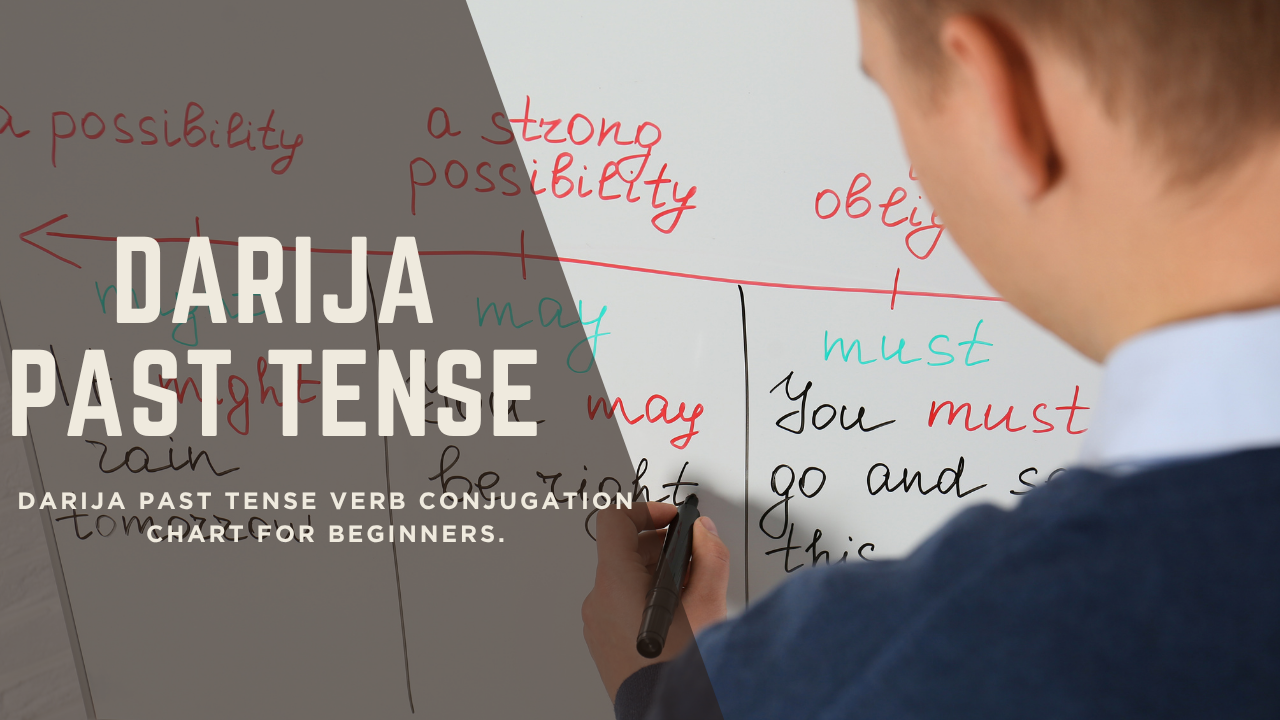Darija Past Tense: A Beginner’s Guide to Verb Conjugation

Introduction
Once you’re comfortable with the present tense in Darija, the next step is learning how to talk about the past. Whether you want to say “I ate couscous yesterday” or “We visited Marrakech”, the past tense will help you describe real experiences.
In this post, we’ll break down the basics of past tense conjugation in Moroccan Arabic so you can start telling stories and sharing memories in Darija.
1. The Basics of Past Tense in Darija
Unlike the present tense (which uses prefixes), the past tense mostly uses suffixes attached to the verb root.
👉 Think of it this way:
-
Present tense = prefixes (ka-, kay-, kat-)
-
Past tense = suffixes (-t, -ti, -na, -to, -o)
2. Personal Pronouns Refresher
-
Ana – I
-
Nta – You (m)
-
Nti You (f)
-
Huwa – He
-
Hiya – She
-
Hna – We
-
Ntuma – You (plural)
-
Huma – They
3. Example with Ktab (to write)
| Pronoun | Conjugation | Example Sentence |
|---|---|---|
| Ana | ktabt | Ana ktabt ljawab. (I wrote the answer.) |
| Nta | ktabti | Nta ktabti wahd lmessage. (You [m] wrote a message.) |
| Nti | ktabti | Nti ktabti f lktab. (You [f] wrote in the book.) |
| Huwa | ktab | Huwa ktab lktab. (He wrote the book.) |
| Hiya | ktabat | Hiya ktabat l9isa. (She wrote the story.) |
| Hna | ktabna | Hna ktabna dars. (We wrote the lesson.) |
| Ntuma | ktabto | Ntuma ktabto bezaf. (You [pl] wrote a lot.) |
| Huma | ktabo | Huma ktabo lrisala. (They wrote the letter.) |
4. Common Patterns in the Past Tense
-
Ana → -t (ktabt)
-
Nta/Nti → -ti (ktabti)
-
Huwwa → no suffix (ktab)
-
Hiya → -at (ktabat)
-
Hna → -na (ktabna)
-
Ntuma → -to (ktabto)
-
Humma → -o (ktabo)
5. More Examples with Useful Verbs
-
Kla (to eat)
-
Ana klit couscous. (I ate couscous.)
-
Huma klaw lftour. (They ate breakfast.)
-
-
Shreb (to drink)
-
Hiya shrabat atay. (She drank tea.)
-
Ntuma shrabto lma. (You [pl] drank the water.)
-
-
Msha (to go)
-
Huwa msha lsou9. (He went to the market.)
-
Hna mshina lamdina. (We went to the city.)
-
Tips for Learners
✅ Memorize the suffixes — they are the same for most verbs.
✅ Practice with daily activities (what you ate, where you went, what you did).
✅ Tell mini-stories: “Ana mshit lsou9, shrit lkhodra, w klit m3a sahbi.” (I went to the market, bought vegetables, and ate with my friend.)
Conclusion
Now you can talk about yesterday, last week, or past experiences in Darija! With the present and past tense in your toolkit, you’re ready to start forming complete conversations.
👉 Next step: Learn the future tense in Darija (coming soon in this grammar series).

